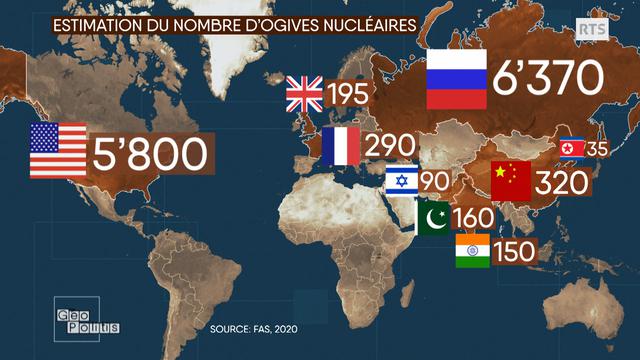Thirty years after the end of the Cold War, history seems to be repeated.While Russian nuclear forces are on alert and NATO publicly announces to fear the use of such weapons by the Russian army within the Ukrainian conflict, the specter of a nuclear war is resurfaced.
The use of a nuclear weapon is still relatively unlikely.The use of nuclear weapons on the part of Russia would impose a military response from NATO and an intensification of the conflict which could lead to a devastating nuclear exchange that the Russians do not wish more than the Western powers.
Despite this, the risk of a nuclear "shooting" is still at its highest level since the end of the Cold War.As unrealistic as a nuclear war may seem today, a large -scale invasion of Ukraine seemed just as unlikely for some weeks ago.
If Russian military doctrine calls for dissuading a conflict against NATO conventional forces by the threat of the use of low -power tactical nuclear bombs on the battlefield, it is difficult to imagine what such a nuclear usewould have against Ukrainian forces which seem to adopt guerrilla tactics by avoiding any direct confrontation with the Russian forces.Even if there was any logic for the use of nuclear weapons for military purposes for the first time since 1945, the unprecedented impact that this gesture would have on the Vladimir Putin regime and Russia are difficult to estimate soThey would be large and would eclipse any conceivable advantage.

The use of nuclear weapons, even a tactical weapon, much less powerful than the strategic thermonuclear weapons developed during the Cold War to target and destroy large urban and industrial centers on both sides of the iron curtain, would inevitably lead to a newConfrontation at the heart of Europe, while NATO would redeploy its nuclear arsenal to the territory of its members to restore its dissuasive force.
Just like at the top of the tensions of the Cold War, NATO and Russia would therefore contradict their nuclear weapons on each other while the Ukrainian conflict would potentially rage at the same time, which would constitute a dangerously unstable geopolitical situation whichis not to the advantage of the Kremlin.In the medium or long term, the Russians also have no interest in launching a new arms race that they do not have the means to finance, which the use of nuclear weapons on their part guaranteespractically.
However, the proper of war is its unpredictable nature.The confusion which reigns within the fog of war, in which political and military leaders must navigate within a conflict at multiple fronts like that of Ukraine, is conducive to poor calculations and their disastrous consequences.As Marx said, history is still repeated, the first time as a tragedy, the second time as farce.
Let's just hope that rational minds will prevail.
Author
Montreal-Québec-Canada
The texts published within the framework of the "Mail" section only engage their authors and do not necessarily reflect the point of view of the Orient-Le Jour.Please limit your texts to a thousand words or around 6,000 characters, including space.








